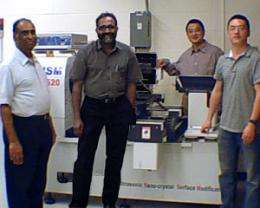UC creates stronger, longer lasting medical implants

University of Cincinnati researchers have discovered that laser shock peening has an amazing effect when applied to magnesium alloys. When used on a magnesium alloy, LSP makes the alloy stronger and better controls the rate of corrosion.
Modern medicine is truly phenomenal. With the ever-advancing medical technology that we have today, our quality of life is drastically improved and prolonged. In the realm of this technology, medical devices are being created and improved upon for the benefit of both the patient and society. As one of the leading engineering and medical research universities, UC is no stranger to medical innovation.
Innovative research by the University of Cincinnati's Seetha Ramaiah Mannava has won him a nomination in the 2nd Annual Cincinnati USA Innovation Awards: Outstanding Advanced Engineering Innovation category. The Innovation Award for an Outstanding Advanced Engineering Innovation is made to a company “that has achieved a significant milestone in advanced engineering- where technology is used to design a product.”
The Innovation Awards celebrate innovative people and companies “that show how new ideas can be developed into fuel for the Tri-State’s economic engine.” The award is being presented by the Cincinnati USA Regional Chamber and Community Partner, "The Cincinnati Business Courier" and CincyTech. Winners will be announced at an event on April 17, 2012, and will be featured in the April 20th "Business Courier." Mannava, adjunct research professor in UC's College of Engineering and Applied Science, has patented “a concept to control the life of a biodegradable medical implant device using engineered surface treatment [which] was disclosed to UC by Mannava, Dong Qian and Vijay Vasudevan and John Yin.”
After earning his doctorate and retiring from a distinguished career at General Electric, Mannava came to UC. With him, he brought the laser system he had been using at GE. Originally, this laser system was used on GE’s aerospace engine parts to strengthen metals. The laser system supports the laser shock peening (LSP) process, and it is the key to Mannava’s innovation.
While experimenting with new applications of the LSP process, he found that it has an amazing effect when applied to a magnesium alloy (which is magnesium mixed with other metals). When used on a magnesium alloy, LSP makes the alloy stronger and better controls the rate of corrosion. With this process, Mannava is revolutionizing the medical world. He intends to employ LSP on biodegradable medical implant devices.
Mannava and his team of engineers have found that the LSP process created magnesium alloys which “demonstrate a much closer elastic modulus to the cortical bones compared with other materials currently used in implant devices. The LSP-treated magnesium alloy implants offer better ductility than the synthetic HA and higher strength than DL-PLA materials.” They intend to apply the process to “orthopedic bio-absorbable bone pins, screws and plates (currently made from polymeric materials by several manufacturers). These are widely used in the reabsorbable shoulder, ACL/PCL, meniscus and fracture fixation devices.”
Since magnesium is a natural element in the human body, when magnesium metal is used in medical implants, the implant will be naturally absorbed into our body, similar to the absorbable stitches used in internal surgeries. Now, these laser-shocked biodegradable devices will resist corrosion and remain in place for a longer period of time. This allows the patient who has received the implant to have not only a stronger implant but a quicker recovery.
Additionally, the process will reduce costs for both the industry professionals and the patient who needs the implants as the magnesium implants themselves are stronger and do not require follow-up doctor’s visits or surgical removal after the bone knits and heals..
Mannava’s project has been selected by UC for 2012 Third Frontier support through the Technology Validation and Startup Fund Program to develop a product. He hopes to identify a collaborator and a product line to initiate manufacturing the research team’s products.
Mannava emphasized one thing about his research, “It is not just me doing the work. It is truly a team effort!” With the help of Mannava and his team, UC’s reputation for excellence in the medical world continues to pulsate strongly!
















